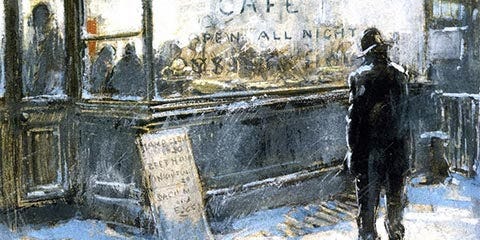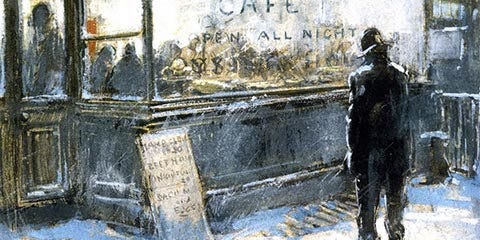Contrast
by Emily Dickinson
A door just opened on a street —
I, lost, was passing by —
An instant's width of warmth disclosed,
And wealth, and company.
The door as sudden shut, and I,
I, lost, was passing by, —
Lost doubly, but by contrast most,
Enlightening misery.
America was the wealthiest nation in the world. While there was always a certain amount of poverty, it was never to the extent it is now. Children go to school hungry because their parents cannot afford food. The price of food has soared while salaries cannot keep up. It is now expensive for people to buy a home. Added to that is the fact that rental apartments have also soared in price. Emily Dickinson’s poem now has a sad relevance to the America we know today.
The poem "Contrast" by Emily Dickinson demonstrates the sharp difference between abundance and poverty when the door opens and slams shut. What is caught in this moment is a glimpse of warmth, connection, and wealth. The glimpse heightens a sense of loss, alienation, and deprivation. There is tension between what can be seen and what is experienced, which increases awareness of the speaker's current state.
The poem is a story of the simplest activity: a door opening. But as a result, a world full of warmth, wealth, and companionship is revealed. For the lost narrator, this glimpse represents all that he lacks. It's a moment of possibility, hope, and deprivation. Inside the door is a version of life that seems impossible to access. It creates images of longing, yet the passing nature of the vision balances it. The briefness of the experience underlines how fragile and elusive such moments can be.
Whenever the door slams shut, the speaker is in a state of heightened isolation. The door closing is not only a physical barrier but a symbolic one, reinforcing the separation between the speaker and the world they observed. The return to their previous state of being is now more painful because of the brief exposure to what could be. The contrast between the two moments magnifies their misery, making their feelings more acute and illuminating the depth of their loneliness.
This poem captures a common human experience: how transient flashes of happiness or connection with others remind us of our unhappiness or lack. One of those forces heightens sensitivity toward joy and sadness. Dickinson juxtaposes moments of warmth versus isolation to invite readers to reflect upon how brief glimpses of something better can affect our perception of what we have or lack.
It ultimately creates a poignant meditation on the interplay between hope and despair, poverty and wealth. Capturing life's contrasts brings about contrasting enlightenment that can only increase our feelings of longing. Dickinson also shows how brief moments might make up our emotional landscape, marking our hearts with a lifelong impression.







Thank you for sharing this beautiful poem. In its original (and unique) form, it presents her irregular capitalizations and dashes:
A Door just opened on a street —
I — lost — was passing by —
An instant's Width of Warmth disclosed —
And Wealth — and Company.
The Door as sudden shut — And I —
I — lost — was passing by —
Lost doubly — but by contrast — most —
Informing — Misery.
We may note that many, though by no means all of the nouns are capitalized. Moreover, she gave us fifteen dashes in her eight-line poem!
Perhaps more significant is the final adjective. Every source I checked indicated "informing" misery, although I strongly prefer your "enlightening"!
Again, gratitude. This poem is amazingly relevant at this point in our history.